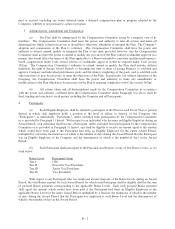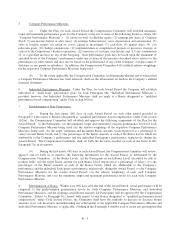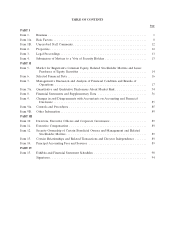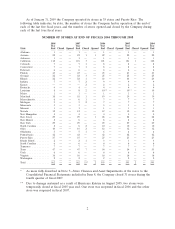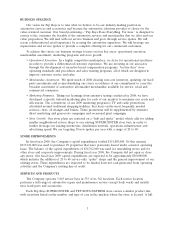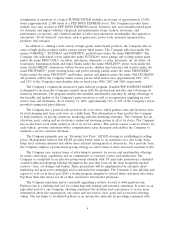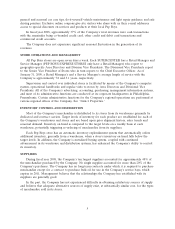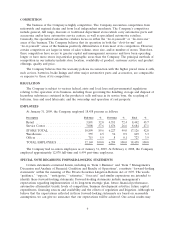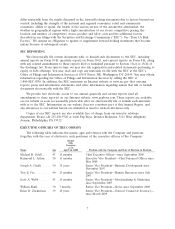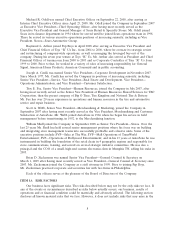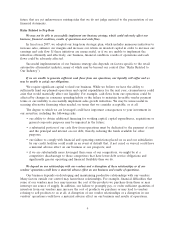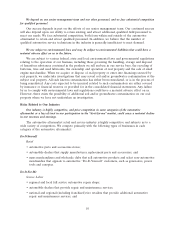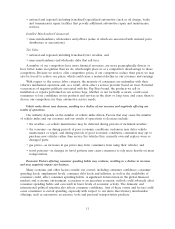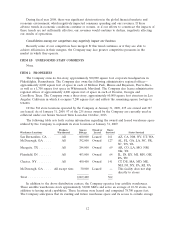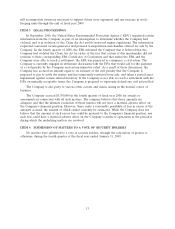Pep Boys 2008 Annual Report Download - page 68
Download and view the complete annual report
Please find page 68 of the 2008 Pep Boys annual report below. You can navigate through the pages in the report by either clicking on the pages listed below, or by using the keyword search tool below to find specific information within the annual report.complement of inventory at a typical SUPERCENTER includes an average of approximately 23,000
items (approximately 21,000 items at a PEP BOYS EXPRESS store). The Company’s product lines
include: tires (not stocked at PEP BOYS EXPRESS stores); batteries; new and remanufactured parts
for domestic and import vehicles; chemicals and maintenance items; fashion, electronic, and
performance accessories; and a limited amount of select non-automotive merchandise that appeals to
automotive ‘‘Do-It-Yourself’’ customers, such as generators, power tools, personal transportation
products, and canopies.
In addition to offering a wide variety of high quality name brand products, the Company sells an
array of high quality products under various private label names. The Company sells tires under the
names CORNELL, FUTURA and DEFINITY; and batteries under the name PROSTART. The
Company also sells wheel covers under the name FUTURA; water pumps and cooling system parts
under the name PROCOOL; air filters, anti-freeze, chemicals, cv axles, lubricants, oil, oil filters, oil
treatments, transmission fluids and wiper blades under the name PROLINE; power tools under the
name ALLEGHENY; alternators, battery booster packs, alkaline type batteries and starters under the
name PROSTART; power steering hoses and power steering pumps under the name PROSTEER;
brakes under the name PROSTOP and brakes, starters and ignition under the name VALUEGRADE.
All products sold by the Company under various private label names were approximately 28%, 27%
and 24% of the Company’s merchandise sales in fiscal years 2008, 2007 and 2006, respectively.
The Company’s commercial automotive parts delivery program, branded PEP EXPRESS PARTS,
is designed to increase the Company’s market share with the professional installer and to leverage its
inventory investment. The program satisfies the installed merchandise customer by taking advantage of
the breadth and quality of the Company’s parts inventory as well as its experience supplying its own
service bays and mechanics. As of January 31, 2009, approximately 76% or 425 of the Company’s stores
provided commercial parts delivery.
The Company has a point-of-sale system in all of its stores, which gathers sales and inventory data
by stock-keeping unit from each store on a daily basis. This information is then used by the Company
to help formulate its pricing, inventory, marketing and merchandising strategies. The Company has an
electronic parts catalog and an electronic commercial invoicing system in all of its stores. The Company
has an electronic work order system in all of its service centers. This system creates a service history for
each vehicle, provides customers with a comprehensive sales document and enables the Company to
maintain a service customer database.
The Company primarily uses an ‘‘Everyday Low Price’’ (EDLP) strategy in establishing its selling
prices. Management believes that EDLP provides better value to its customers on a day-to-day basis,
helps level customer demand and allows more efficient management of inventories. On a periodic basis,
the Company employs a promotional pricing strategy on select items to drive increased customer traffic.
The Company uses various forms of advertising to promote its service and merchandise offerings,
its service and repair capabilities and its commitment to customer service and satisfaction. The
Company is committed to an effective promotional schedule with TV and radio promotions, scheduled
around traditional shopping holidays throughout the year that focus on the most frequently needed
services—tires, oil changes and brakes. These promotions will be supplemented by extensive direct
marketing and grass-roots campaigns and occasional print campaigns. The Company is also piloting and
expects to roll out in fiscal year 2009, a loyalty program designed to reward these customers who make
Pep Boys their first choice for all of their automotive aftermarket purchases.
The Company maintains and is constantly upgrading a website located at www.pepboys.com.
Pepboys.com is a multifaceted tool for connecting with existing and potential customers. It serves as an
important portal to our Company, allowing consumers the freedom and convenience to access more
information about the organization, our stores and our service, tires, parts and accessories offerings
online. The site helps to establish Pep Boys as an automotive authority by providing consumers with
4


